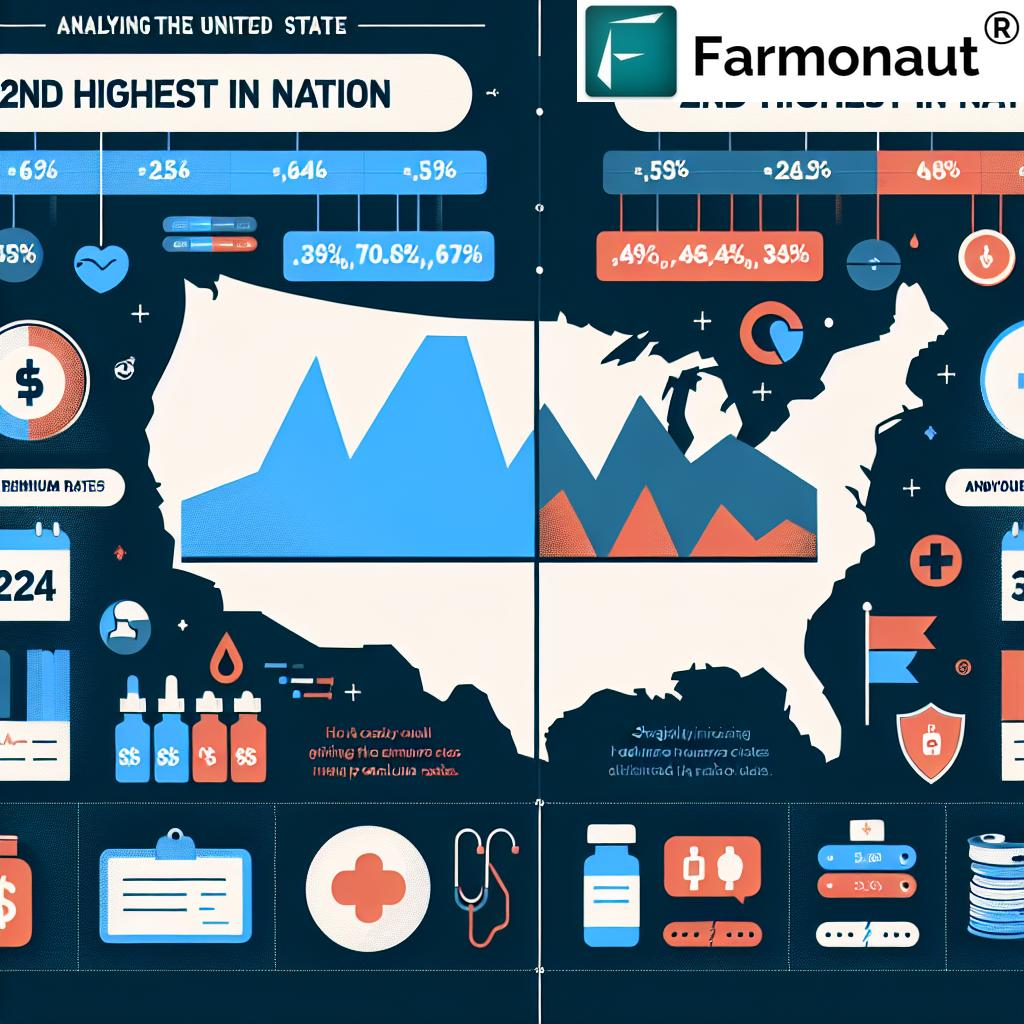Massachusetts Health Insurance Crisis: Analyzing Rising Costs and Exploring Solutions for 2024
“Massachusetts family health insurance premiums rank second-highest nationally, with average rates increasing significantly for individual and small group markets.”
As we delve into the complexities of the Massachusetts health insurance landscape, we find ourselves at a critical juncture. The state, long known for its progressive healthcare policies, is now grappling with a growing crisis that threatens the financial well-being of its residents and the sustainability of its healthcare system. In this comprehensive analysis, we will explore the multifaceted issues driving the Massachusetts health insurance crisis, examine the rising costs that are burdening families and businesses, and investigate potential solutions for 2024 and beyond.
The Current State of Massachusetts Health Insurance
Massachusetts has long been at the forefront of healthcare reform in the United States. However, recent developments have cast a shadow over the state’s once-lauded system. As we enter 2024, the situation has become increasingly dire, with family premiums now ranking as the second-highest in the nation. This alarming statistic is just the tip of the iceberg in a complex web of rising healthcare costs and systemic challenges.
The Massachusetts Division of Insurance (DOI) has reported a significant 7.9% increase in average rates for individual and small group markets for 2024, following a 3.2% hike in 2023. These consecutive increases have left many residents struggling to afford essential health coverage, prompting the DOI to launch an investigation into the underlying causes of this medical inflation through a series of public hearings.

Factors Driving Premium Increases
The DOI’s analysis has unveiled multiple factors contributing to the premium increases:
- Medical Costs: A 6.6% rise in medical expenses
- Pharmacy Costs: An alarming 11.8% surge in prescription drug prices
- Administrative Expenses: A smaller but significant 0.6% increase in administrative costs
These figures paint a picture of a healthcare system under immense pressure from various angles. The rapid escalation in pharmacy costs, in particular, has become a major concern for both insurers and policymakers.
The Administrative Cost Debate
At the heart of the ongoing discussions is the role of administrative costs in driving up premiums. Despite a cap on administrative spending at 12% of an insurer’s overall costs, many health plans are finding it challenging to keep these expenses under control. This struggle is particularly evident in the context of digital transformation and enhanced consumer services.
For instance, Darren Bennett, CFO of Boston Medical Center Health Plan, and Lucy Silva, CFO of Massachusetts General Brigham Health Plan, have highlighted the significant costs associated with improving consumer experiences in the digital age. These investments, while necessary for modernizing healthcare delivery, are contributing to the overall increase in premiums.
Balancing Affordability and Quality Care
As the DOI works on recommendations to control rising premiums, Deputy Commissioner Kevin Beagan emphasizes the need to strike a delicate balance between affordability and maintaining high-quality healthcare services. This challenge lies at the core of the Massachusetts health insurance crisis and reflects a broader national debate on healthcare reform.
The forthcoming report in February is anticipated to offer actionable solutions. However, Massachusetts residents remain anxious about potential further increases in healthcare costs, particularly as pharmacy and medical expenses show no signs of abating.
The Role of Technology in Healthcare Cost Management
Amid these challenges, experts are looking towards technology as a potential solution to streamline operations and lower costs. The integration of artificial intelligence (AI) and automation in healthcare administration holds promise for reducing inefficiencies and potentially curbing the rise in administrative expenses.
However, there is caution regarding the expectation that technology alone can resolve systemic issues in the healthcare realm. While digital tools can enhance consumer experiences and improve operational efficiency, their implementation comes with its own set of costs and challenges.
“The U.S. healthcare system spends massive amounts yet struggles with inefficiencies, prompting debates on digital transformation’s role in cost management.”
The National Context: U.S. Healthcare System Inefficiencies
The Massachusetts health insurance crisis is a microcosm of broader issues plaguing the U.S. healthcare system. In 2020, the nation spent a staggering $4.1 trillion on healthcare, equating to approximately $12,530 per person. Despite this massive expenditure, the U.S. continues to lag behind other high-income countries in terms of healthcare outcomes and accessibility.
This discrepancy raises fundamental questions about the sustainability and efficiency of the American healthcare model. As Massachusetts grapples with its own challenges, it becomes clear that solutions must address not only state-specific issues but also the systemic problems inherent in the national healthcare landscape.

The Regulatory Burden on Healthcare Providers
Karen Granoff from Massachusetts Health and Hospital Management has shed light on the challenges providers face due to the complex array of insurance plans and administrative requirements. These regulatory burdens not only contribute to rising costs but also lead to delays in patient care, presenting real risks to patient health.
The intricate web of regulations, while designed to ensure quality and safety, has inadvertently created a system where providers spend significant time and resources navigating bureaucratic processes rather than focusing on patient care. This regulatory complexity is a key factor in the rising administrative costs that are ultimately passed on to consumers through higher premiums.
Exploring Solutions for the Massachusetts Health Insurance Crisis
As we look towards 2024 and beyond, several potential solutions are being considered to address the Massachusetts health insurance crisis:
- Regulatory Reform: Streamlining administrative processes and reducing unnecessary regulatory burdens on healthcare providers and insurers.
- Technological Innovation: Leveraging AI and automation to improve efficiency in healthcare administration and delivery.
- Cost Transparency: Implementing measures to increase transparency in healthcare pricing, enabling consumers to make more informed decisions.
- Pharmacy Cost Controls: Exploring policies to curb the rapid rise in prescription drug prices, including negotiations with pharmaceutical companies.
- Value-Based Care Models: Shifting towards payment systems that reward healthcare outcomes rather than the volume of services provided.
The Path Forward: Balancing Innovation and Affordability
As Massachusetts navigates this complex healthcare landscape, the challenge lies in finding solutions that harness the benefits of technological innovation without exacerbating the cost burden on consumers. The state’s approach to resolving this crisis could serve as a model for national healthcare reform efforts.
Key stakeholders, including policymakers, healthcare providers, insurers, and consumers, must collaborate to develop sustainable solutions that address both immediate cost concerns and long-term systemic issues. This collaborative approach is essential for creating a healthcare system that is not only affordable but also delivers high-quality care to all Massachusetts residents.
Cost Comparison and Impact Analysis
| Cost Category | 2023 Average Cost | 2024 Projected Cost | Percentage Increase | National Ranking | Primary Drivers of Increase |
|---|---|---|---|---|---|
| Family Premiums | $22,800 | $24,600 | 7.9% | 2nd Highest | Medical costs, Pharmacy expenses |
| Individual Market Rates | $6,500 | $7,013 | 7.9% | 5th Highest | Medical inflation, Administrative costs |
| Small Group Market Rates | $7,200 | $7,768 | 7.9% | 3rd Highest | Pharmacy costs, Regulatory compliance |
| Administrative Expenses | $1,560 | $1,569 | 0.6% | N/A | Digital transformation, Consumer services |
| Digital Transformation Costs | $800 | $920 | 15% | N/A | AI implementation, System upgrades |
This table provides a clear overview of the cost increases across various categories in the Massachusetts health insurance landscape. It highlights the significant rise in family premiums and the substantial impact of medical and pharmacy costs on overall healthcare spending.
The Role of Digital Innovation in Healthcare
While digital transformation is contributing to rising costs in the short term, it also holds the potential for long-term cost savings and improved healthcare delivery. Innovations in telemedicine, remote patient monitoring, and AI-assisted diagnostics could revolutionize healthcare accessibility and efficiency.
Companies like Farmonaut, while primarily focused on agricultural technology, demonstrate how digital solutions can transform traditional industries. Their approach to leveraging satellite imagery and AI for precision agriculture offers valuable insights into how similar technologies could be applied to healthcare management and cost reduction.
Policy Implications and Future Directions
The Massachusetts health insurance crisis calls for a multifaceted approach to policy reform. Potential policy directions include:
- Implementing price controls on prescription drugs
- Encouraging the adoption of value-based care models
- Expanding telemedicine services to reduce healthcare delivery costs
- Investing in preventive care programs to reduce long-term healthcare expenses
- Exploring public-private partnerships to drive innovation in healthcare delivery
These policy initiatives must be carefully crafted to address the immediate cost concerns while also laying the groundwork for a more sustainable and efficient healthcare system in the long term.
Consumer Empowerment and Education
An often-overlooked aspect of healthcare reform is the role of consumer empowerment and education. By providing Massachusetts residents with the tools and knowledge to make informed healthcare decisions, the state can foster a more cost-conscious and efficient healthcare ecosystem.
Initiatives such as price transparency tools, health literacy programs, and consumer-friendly insurance plan comparisons can help individuals navigate the complex healthcare landscape more effectively. This empowerment can lead to more judicious use of healthcare resources and potentially lower overall costs.
Collaboration and Innovation in Healthcare
Addressing the Massachusetts health insurance crisis requires unprecedented collaboration between various stakeholders in the healthcare ecosystem. This includes:
- Healthcare providers
- Insurance companies
- Pharmaceutical companies
- Technology firms
- Policymakers
- Consumer advocacy groups
By fostering an environment of open dialogue and shared responsibility, Massachusetts can create innovative solutions that address the root causes of rising healthcare costs while maintaining the high quality of care that residents expect and deserve.
Looking Ahead: The Future of Healthcare in Massachusetts
As we look towards the future, the path to resolving the Massachusetts health insurance crisis remains challenging but not insurmountable. The state’s response to this crisis could set a precedent for healthcare reform efforts across the nation.
Key areas of focus for the future include:
- Continued investment in digital health technologies
- Expansion of preventive care programs
- Reform of pharmaceutical pricing practices
- Streamlining of healthcare administration
- Enhancement of consumer-driven healthcare models
By addressing these areas comprehensively, Massachusetts can work towards creating a healthcare system that is not only more affordable but also more responsive to the needs of its residents.
Conclusion: A Call to Action
The Massachusetts health insurance crisis of 2024 presents both significant challenges and opportunities for reform. As we navigate this complex landscape, it’s clear that there are no simple solutions. However, by embracing innovation, fostering collaboration, and maintaining a commitment to high-quality, affordable care, Massachusetts can emerge from this crisis with a stronger, more sustainable healthcare system.
We call on all stakeholders – from policymakers and healthcare providers to insurers and consumers – to engage actively in this process of reform. The health and financial well-being of Massachusetts residents depend on our collective ability to address these challenges head-on and create meaningful, lasting solutions.
As we move forward, let us remember that the goal is not just to reduce costs, but to create a healthcare system that truly serves the needs of all Massachusetts residents. This crisis is an opportunity for transformation, and with concerted effort and innovative thinking, we can build a healthcare future that is both affordable and exemplary in quality.
Frequently Asked Questions (FAQ)
- Q: Why are health insurance premiums rising so rapidly in Massachusetts?
A: The main drivers are increasing medical costs, surging pharmacy expenses, and rising administrative costs, including those associated with digital transformation. - Q: How does Massachusetts rank nationally in terms of health insurance costs?
A: Massachusetts currently ranks second-highest in the nation for family health insurance premiums. - Q: What role does technology play in the current healthcare cost crisis?
A: While technology offers potential for long-term cost savings, current investments in digital transformation are contributing to rising administrative costs. - Q: Are there any proposed solutions to address the rising healthcare costs?
A: Yes, proposed solutions include regulatory reform, leveraging AI for efficiency, increasing cost transparency, controlling pharmacy costs, and shifting to value-based care models. - Q: How can consumers in Massachusetts manage their healthcare costs?
A: Consumers can utilize price transparency tools, participate in health literacy programs, and carefully compare insurance plans to make informed decisions.
Earn With Farmonaut: Affiliate Program
Earn 20% recurring commission with Farmonaut’s affiliate program by sharing your promo code and helping farmers save 10%. Onboard 10 Elite farmers monthly to earn a minimum of $148,000 annually—start now and grow your income!
For more information on Farmonaut’s API services, visit our API page and check out our API Developer Docs.







